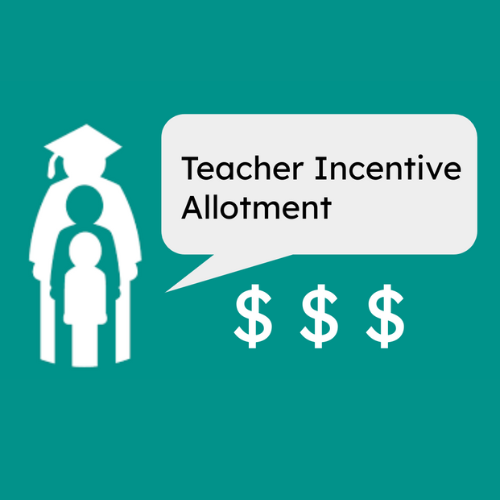Teachers Speak Out on the Consequences of the Teacher Incentive Allotment

With the intention of financially rewarding effective teachers, the Teacher Incentive Allotment will be implemented in Round Rock ISD in phases throughout the 2023-2024 school year.
June 26, 2023
The Teacher Incentive Allotment (TIA), a program with the stated goal of giving teachers a 6-figure salary, will be implemented in Round Rock ISD in phases throughout the 2023-2024 school year. The program gives districts allotment funds for compensation plans to financially reward effective teachers.
“More money would increase my desire to continue teaching,” an anonymous teacher said.
Teachers can earn different designations and, based on that, will receive extra pay from the district. However, some Westwood teachers believe that the designation system is too restrictive. These restrictions have caused frustration among some teachers, who believe that the program doesn’t effectively address any issues.
“The TIA was the legislature’s attempt to retain teachers, who were – and still are – leaving the profession in droves,” Psychology teacher Mr. Jacob Mankovsky said. “The promise of 6-figure salaries sounds great, and easily passed in the Legislature. Unfortunately, at this point, only 4% of all Texas teachers qualify. The senators and congressmen can pat themselves on their backs for helping 4% of the state’s teachers.”
One restriction that has caused some teachers to believe that the TIA is unfair involves the district’s funding allocation plan. The plan doesn’t include high school teachers yet, despite all teachers being held accountable for state testing.
“[The district] will be providing the funds to elementary [teachers] first,” an anonymous teacher said. “Who’s to say if high school [teachers] will ever receive a raise down the road? This sounds completely inequitable.”
Additionally, teachers believe that the TIA should have immediately applied to all educators, which would have increased its impact.
“The state should have provided the teacher classification system for districts to implement, rather than districts having to make the plan and then submit it for approval,” Mr. Mankovsky said. “This process takes longer than a year, and that’s another year the teachers don’t earn any TIA money. The state is making school districts jump through hoops, which is a huge deterrent to districts starting the process.”
Other teachers believe that it is inequitable to base teacher incentive allotments on student test performances on assessments such as STAAR tests or teacher evaluations. Instead, they argue, teachers should be paid based on their experience and education. In order to eliminate poor teacher performance, the school can fire ineffective teachers anytime. Additionally, in the case of Special students, student test performances don’t accurately reflect teacher quality, according to Special Education teacher Ms. Heather Dickson.
“Oftentimes the abilities of our Special populations are 3 to 4 grades below their peers, and their teachers [need to close] their learning gaps to get them back to their grade level,” Ms. Dickson said. “Those same teachers will not be adequately rewarded due to state assessment [results], when in fact, those teachers are working harder to get them to learn than most teachers.”
The unequal policies of the TIA have led some teachers to believe that the program would cause more harm than good if implemented by RRISD.
“Giving bonuses to some teachers but not all [and] some content areas but not all will only increase the inequity and potentially cause infighting and resentment among staff,” Piano teacher Ms. Julianne Knott said. “I think [the TIA is] a sure fire way to pit teachers against each other and is all kinds of wrong.”
Overall, the main complaints teachers have regarding the TIA concern the district’s intentions. According to Mr. Mankovsky, who doesn’t expect to be eligible for the TIA for at least another 2-4 years, if lawmakers truly cared about teachers, they would prioritize the improvement of teacher salaries over social and cultural issues.
“TIA [just] allowed the legislature to say ‘we care about our teachers,’ despite the fact [that] their actions say otherwise,” Mr. Mankovsky said. “I think of myself as a high-quality teacher. I’ve been teaching for 16 years, of which 13 have been spent teaching advanced AP and IB courses. For over a decade, my students have performed well at an extremely high rate on standardized AP and IB exams. Despite this, I don’t earn an extra dime. TIA does nothing for me.”
Some suggestions from teachers to replace the TIA include increasing the basic allotment, providing cost-of-living adjustments for retired teachers, and raising the across-the-board pay for current educators.
“[I’m] not [teaching] for the money, but to serve our community,” an anonymous teacher said. “The low salary makes it difficult for unmarried people to stay in the profession, and for low-econ schools to close the gap. If they have excess [money], why not raise salaries?”
Of all the teachers who responded to a survey sent out by Westwood Student Press, roughly half responded that the TIA has affected or could affect their decision to remain a teacher at Westwood. Some of the teachers who answered that the TIA could affect their decision mentioned that programs such as the TIA, combined with the current state of teacher funding, has caused them to feel taken advantage of and pushed them to consider a career change. However, most teachers who opposed or didn’t care about the TIA offered suggestions for improvements.
“Teachers should be recognized for the experts they are and be paid accordingly, regardless of the performance of their students,” Ms. Knott said. “This would increase the pool of job applicants and competition for positions, which will over time increase the quality of education for all students.”



Kristen • Apr 2, 2024 at 8:05 am
I hate the TIA. Teacher observations are subjective, student performance looks different, and not all teachers get to participate. I understand what Texas is going for, but they missed the mark with this one.
I have been teaching for 28 years, have a Master’s degree, and have many other certifications. I am a Dyslexia Interventionist, and my students always show growth. My growth exceeded what I needed in the growth category. I was .4 away from reaching the goal because of an evaluation that did not match the curriculum provided by the district. How is that fair? It is a huge slap in the face.
Now I am even less motivated to go the extra mile. I have NO incentive to work harder and it stinks. I have seen a great divide among teachers and teams. This is not the answer.
Kathrine • Jun 27, 2023 at 12:49 pm
I absolutely dislike and disagree with the TIA. As a CTE teacher teaching an non-tested subject, I have yet to hear how others like me would if ever qualify. Further, according to the TIA some teachers would automatically qualify if certified by College Board. That alone should not be in the plan. Just because you are certified by college board doesn’t mean you’re an effective teacher. The fact that high schools are the last to implement this plan is also inequitable. It amazes me that teachers as a whole were not given the opportunity to chose whether or not this was a good plan. They need to go back to the drawing board. Too many teachers are left out.